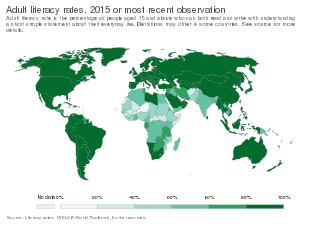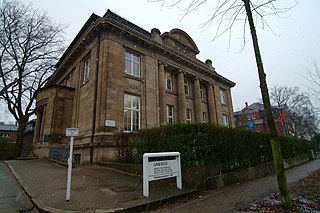Related Research Articles

Literacy is popularly understood as an ability to read, write and use numeracy in at least one method of writing, an understanding reflected by mainstream dictionary and handbook definitions. Starting in the 1980s, however, literacy researchers have maintained that defining literacy as an ability apart from any actual event of reading and writing ignores the complex ways reading and writing always happen in a specific context and in tandem with the values associated with that context. The view that literacy always involves social and cultural elements is reflected in UNESCO's stipulation that literacy is an "ability to identify, understand, interpret, create, communicate and compute, using printed and written materials associated with varying contexts." Modern attention to literacy as a "context-dependent assemblage of social practices" reflects the understanding that individuals' reading and writing practices develop and change over the lifespan as their cultural, political, and historical contexts change. For example, in Scotland, literacy has been defined as: "The ability to read, write and use numeracy, to handle information, to express ideas and opinions, to make decisions and solve problems, as family members, workers, citizens and lifelong learners."

Adult education, distinct from child education, is a practice in which adults engage in systematic and sustained self-educating activities in order to gain new forms of knowledge, skills, attitudes, or values. It can mean any form of learning adults engage in beyond traditional schooling, encompassing basic literacy to personal fulfillment as a lifelong learner.
The Association of College & Research Libraries defines information literacy as a "set of integrated abilities encompassing the reflective discovery of information, the understanding of how information is produced and valued and the use of information in creating new knowledge and participating ethically in communities of learning".
The education and schools in Africa have changed a lot over time. Ever since it was first introduced to Africa, it has been an important part to the history of the continent. This article describes the problems, technology, history, and other information about education in Africa.

Literacy in India is a key for socio-economic progress, Despite government programmes, India's literacy rate increased only "sluggishly". The 2011 census, indicated a 2001–2011 decadal literacy growth of 9.2%, which is slower than the growth seen during the previous decade. An old analytical 1990 study estimated that it would take until 2060 for India to achieve universal literacy at then-current rate of progress.
International Literacy Day is an international observance, celebrated each year on 8 September, that was declared by UNESCO on 26 October 1966 at the 14th session of UNESCO's General Conference. It was celebrated for the first time in 1967. Its aim is to highlight the importance of literacy to individuals, communities and societies. Celebrations take place in several countries.
Skills for Life was the national strategy in England for improving adult literacy, language (ESOL) and numeracy skills and was established as part of the wider national Skills Strategy to increase the numbers of young people and adults with adequate skills. The strategy was launched by the Prime Minister, Tony Blair, in March 2001.
Education For All (EFA) is a global movement led by UNESCO, aiming to meet the learning needs of all children, youth and adults by 2015.
Sharan B. Merriam is professor of adult education at the University of Georgia. Her focus has been researching and writing about adult learning and the foundations of adult education. She has won the Cyril O. Houle Award for Outstanding Literature in Adult Education for three of her books. In 1998 she was a senior Fulbright scholar to Malaysia.
UNESCO leads the United Nations Literacy Decade (UNLD) under the slogan of “Literacy as Freedom”. Launched at UN Headquarters in 2003, the Decade aims to increase literacy levels and to empower all people everywhere. In declaring this Decade, the international community recognised that the promotion of literacy is in the interest of all, as part of efforts towards peace, respect and exchange in a globalizing world.
The UNESCO Confucius Prize for Literacy recognizes the activities of outstanding individuals, governments or governmental agencies and non-governmental organizations (NGOs) working in literacy serving rural adults and out-of-school youth, particularly women and girls. The Prize was established in 2005 through the support of the Government of the People's Republic of China in honour of the great Chinese scholar Confucius. It is part of the International Literacy Prizes, which UNESCO awards every year in recognition of excellence and inspiring experiences in the field of literacy throughout the world. The Confucius Prize offers two awards of US$20,000 each, a medal and a diploma, as well as a study visit to literacy project sites in China.

Education in Mali is considered a fundamental right of Malians. For most of Mali's history, the government split primary education into two cycles which allowed Malian students to take examinations to gain admission to secondary, tertiary, or higher education. Mali has recently seen large increases in school enrollment due to educational reforms.

The UNESCO Institute for Lifelong Learning (UIL), formerly UNESCO Institute for Education, is one of six educational institutes of UNESCO. It is a non-profit international research, training, information, documentation and publishing centre on literacy, non-formal education, adult and lifelong learning. It provides services to UNESCO's Member States, NGOs, and grassroots and community organizations, as well as to partners in civil society and the private sector. The Institute works in close collaboration with its Paris headquarters, with UNESCO field offices in different countries, with sister institutes and with national and international partners.
The UNESCO King Sejong Literacy Prize is an annual prize awarded to two institutions, organizations or individuals "for their contribution to the fight against illiteracy."

Mushtaq Ahmed Azmi, was a mass literacy expert. He was one of the first non-officials to be associated with the development of Adult Education program in India from the early 1950s, and was an early leader of the mass literacy movement. As an officer of UNESCO, he was posted in Africa and seconded to lead mass literacy programs in Nigeria and Zambia. He was offered a position in the UNESCO by the British diplomat and head of fundamental education at UNESCO John Bowers.

Michael Abiola Omolewa is a Nigerian diplomat, scholar, education historian, and civil servant. From September 2003 to October 2005, he served as the 32nd president of the General Conference of the United Nations Educational, Scientific and Cultural Organization (UNESCO). While president, Omolewa led UNESCO to adopt the International Declaration on Human Genetic Data and the Convention for the Safeguarding of Intangible Cultural Heritage. From January 2000 to August 2009, Omolewa served as permanent delegate and ambassador of Nigeria to UNESCO. At University of Lagos, on Wednesday 6 February 2019, Omolewa delivered the 5th Enoch Adeboye Annual Birthday Public Lecture; titled: Peace: The Global Quest.
Yes, I Can is a teaching method for adult literacy which was developed by Cuban educator Dr. Leonela Relys Diaz and first trialled in Haiti and Nicaragua in 2000. To date, this method has been used in 29 nations allowing over 6 million people to develop basic literacy. The program was originally developed in Spanish and known as Yo, sí puedo. It has now been translated into many languages including Portuguese, English, Quechua, Aymara, Creole and Swahili. The Yes I Can literacy method uses pre-recorded lessons on video or DVD that are delivered by a local facilitator. Yes I Can also uses an alphanumeric association between numbers and letters.
Daniel A. Wagner is the UNESCO Chair in Learning and Literacy, and Professor of Education at the University of Pennsylvania where his research specializes in learning, literacy, child development, educational technologies, and international educational development. He is founding Director (1983) of Penn’s Literacy Research Center and the federally funded National Center on Adult Literacy (1990). In recent years, the center has become the International Literacy Institute (ILI), co-established by UNESCO and the University of Pennsylvania. Wagner is also the Director of Penn’s International Educational Development Program (IEDP) and is a Fellow of the American Psychological Association, the American Anthropological Association, and the American Educational Research Association. He is the author numerous books and articles on learning, literacy, cross-cultural research and methodologies, and is a frequent speaker at major national and international conferences across the world. He has worked as an advisor to, among others, the World Bank, UNESCO, UNICEF, USAID, and DFID. In 2012, Wagner was appointed by Hillary Clinton as a Member of the U.S. National Commission for UNESCO. In the same year, he was named UNESCO Chair in Learning and Literacy. In 2012-2014, he served as Chair of the Brookings Global Research Task Force on Learning. In 2014, he was a recipient of the UNESCO Confucius International Literacy Prize. He has maintained multi-year educational projects in India, South Africa, and Morocco.
Global Reports on Adult Learning and Education (GRALE) are a series of reports that monitor progress on Adult Learning and Education (ALE), promote action, identify trends in the field of ALE, and explore solutions to challenges.
National Education Mission was launched in 2018. It was allocated a budget of ₹385.72 billion (US$5.4 billion) in 2019 Interim Union Budget of India. The mission comprises four schemes viz. Saakshar Bharat, Sarva Shiksha Abhiyan, Rashtriya Madhyamik Shiksha Abhiyan and Centrally Sponsored Scheme on Teacher Education (CSSTE).
References
- ↑ Rogers, Alan. Re-Thinking Adult Literacy and Post-Literacy: From an International Perspective. The Roby Kidd Memorial Lecture. Uppingham Press (2002)
- ↑ World Bank. Post-Literacy and Continuing Education for Human Development Project Bangladesh (2001). Accessed 2009-03-27